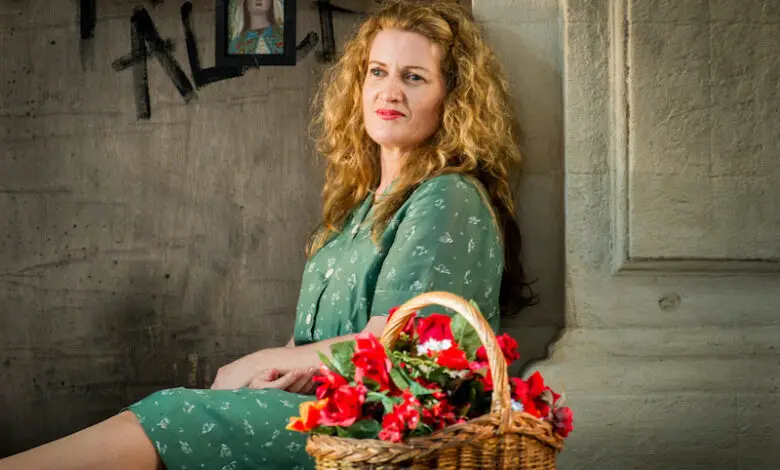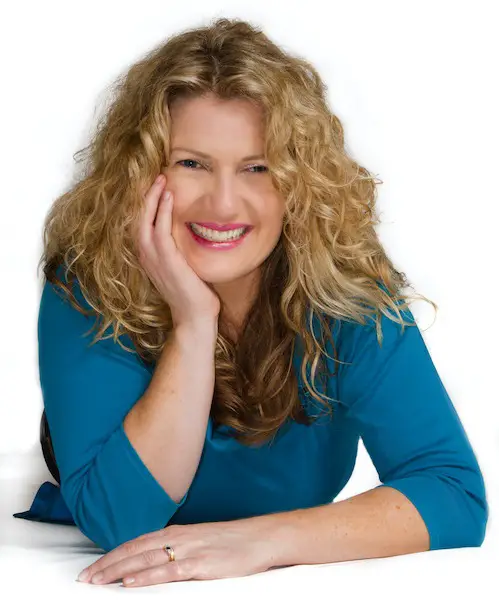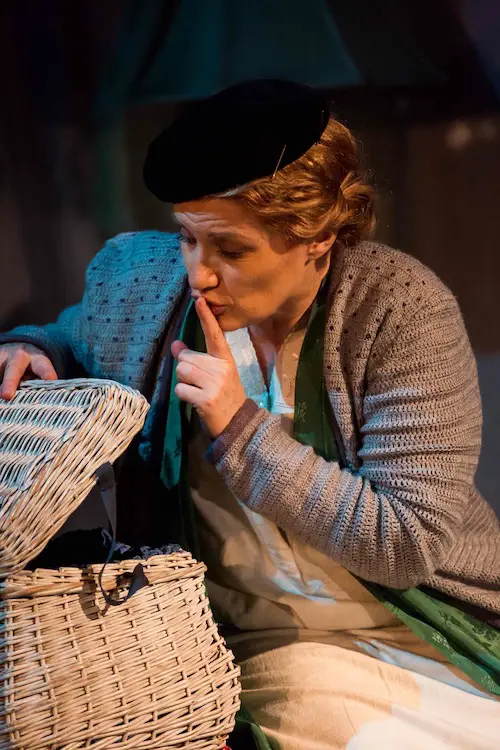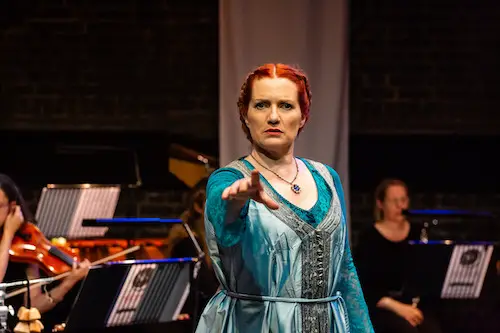
Joanne Roughton-Arnold: visually impaired violinist, opera singer and founder of FormidAbility
Joanne Roughton-Arnold is a visually impaired violinist and opera singer. She was born in New Zealand and moved to the UK to undertake violin and vocal studies at post-grad level. Joanne is also the founder of the opera company FormidAbility, which makes opera accessible to both disabled artists and audiences.
Our writer, Emma Purcell, got the opportunity to interview Joanne about her life with a visual impairment, her career in the performing arts and her upcoming show titled The Bridge Between Breaths, which will be part of the 2020 Tête à Tête Opera Festival and streamed online 8th September and be available to view until 6th October.
Joanne Roughton-Arnold on living with a visual impairment
What is your eye condition and how does it affect you on a daily basis?
I have Ocular Albinism with subsequent congenital nystagmus. The Albinism means I have no pigments in my retina, so I’m hyper-sensitive to bright light. I have some very snazzy tinted green contact lenses that reduce the glare and means that when I’m working on stage, I don’t have to squint.
Nystagmus means that I see everything out of focus, unless it’s really close to me. The further away something is, the harder it gets to see, and tiredness or stress makes it worse.
Nystagmus also causes my eyes to kind of wobble involuntary from side to side. Because each eye moves independently from the other, that means the brain can’t turn the two images into one 3D image, so I don’t have real depth perception.
It means I have to be careful about certain things, such as the depth of steps. I have to think very carefully about social distancing at the moment.
 What was it like growing up with your visual impairment in New Zealand?
What was it like growing up with your visual impairment in New Zealand?
Growing up I wasn’t really aware that being visually impaired was called a disability. It was just my life. On the one hand, that’s brilliant because it meant I just got on with things. But on the other side, if I’d had more information about my visual impairment, it would have made life easier.
As a child, I didn’t know I had no depth perception. I had no idea why everybody else could easily catch a ball while I really struggled. During PE classes, if I went running out to the high jump, I was never quite sure when to jump because I was never quite close enough.
At the age of 12, I had a wonderful teacher who really understood my difficulties and wanted to make me more confident.
One day, we were doing the high jump and she said she would teach everyone to do a technique, using me to demonstrate to the class.
I was concerned, but she said: “Trust me, do what I tell you exactly when I tell you to do it.” So, I trusted her. When she told me to run, I ran, turn, I turned and jump, I jumped – and I went over.
I think myself and the whole class were gobsmacked that I had actually done something that they had not.
She also taught me how to catch a ball by really watching what I did and finding a solution. She was just one of those teachers who had a lovely effect on me. I will remember her forever.
Do you require any adaptations when performing?
Discovering that I can use an iPad instead of hard copies for reading music has been a complete game-changer. It means I can pinch and zoom in on the screen, which makes such a difference.
When I’m singing in an orchestra, I can’t always see the conductor making eye contact at me, so I always ask them to do a big gesture or say something when they want me to play or sing.
I also need to walk around a set before performing so that I can learn whether a line across the surface is actually a change of level or just a line.
Joanne Roughton-Arnold working in the performing arts industry
When did you first become interested in the performing arts?
My mum encouraged me to learn music at home and she really helped me. I remember playing a recorder when I was little and doing it by ear. I really enjoyed the challenges of trying to figure out how to play something.
When I was 11, a string orchestra came to my school and the sound just hit me. I loved it and the way it made me feel.
I began violin lessons with the conductor of that orchestra, and that was just brilliant. She was my teacher for 11 years and she taught me right through from the beginning to professional, ready to come over to the UK.
Why did you move to the UK?
There was a Hungarian violin teacher in Oxford that I really wanted to have lessons with. I met her in New Zealand when she came over to do masterclasses and just loved her approach. I asked her, “If I get to Oxford, will you teach me?” and she said, “Of course”.
So, I saved my pennies, came over to the UK and studied violin with her. It was also a chance for me to see if I could make my love of music into a career.
I did about three years of lessons with her, all while scrimping and saving to make ends meet. I then went to Trinity College of Music in London to do a post-grad violin year.
Why did you go from being a violinist to an opera singer?
While I was at Trinity College, I could choose a second subject, so I decided to do vocal studies.
The wonderful singing teacher there was semi-retired, so I didn’t have my singing lessons at the college, but instead had to her house in Highgate, where she had a music studio in her back garden. She was delightful and I learnt so much from her.
It was then that I slowly started to think that singing was the direction I wanted to be going in. This was quite a scary decision to make.
When I decided at the age of 12 that I wanted to be a violinist, nothing was going to change my mind. But, here I was, in my mid-twenties, starting to doubt that. I was thinking maybe singing was something I wanted even more.
Following my studies at Trinity and three years of singing lessons, I went to the Royal Birmingham Conservatoire to do my masters in voice studies. I got to do lots of performances during that time, which I loved.
Also, because I was already a violinist, that meant I could sing new classical music, which is often quite tough musically and intellectually. It’s like a difficult puzzle that I had to figure out and put together.
I do still teach the violin, but I don’t have time to do the hours of violin practice that professionals need to do because I need to do my singing practise.
But when I feel the urge to play some violin music that I love, such as something by Bach, I have a lovely time playing to myself.
What work did you do when you first started as a professional musician?

My first contract was singing at the Investec Opera Holland Park in London, which is a lovely summer festival that happens every year. It gave me loads of stage experience, singing in the chorus and giving me some small roles – it was all great learning experience.
From there, I went on to do some research and development work at the Royal Opera House. This wasn’t public as we were trying out a new opera to see if it was something we wanted to put on.
Now I sing with the British Paraorchestra, which I just love. The Paraorchestra was founded by Charles Hazlewood with the idea of addressing the lack of disabled musicians in the profession. It’s about integrating and creating a healthy mix of disabled and non-disabled musicians on stage together.
What kind of singing performances have you done and did you encounter any difficulties securing roles because of your visual impairment?
Immediately after finishing my masters, I had some difficulties with other people’s attitudes toward me being a visually impaired opera singer.
The sense I got at the time was that if you’re visually impaired, it might be too dangerous for you backstage because it’s dark and there are lots of obstacles.
This is a load of rubbish. I actually think visually impaired people are probably more careful about that kind of thing and are used to constantly being aware of their surroundings.
When I started doing auditions, no one could tell by looking at me that I was visually impaired. After I had finished singing, I would openly discuss it and reassure them that I’m not any kind of health and safety risk.
On stage, I have done and can do all the things my sighted colleagues can, and there has never been a problem.
However, I started to find that I wasn’t getting any parts, so I decided to stop saying anything about my disability. Music and performance is an incredibly competitive profession and you often don’t know why you have been rejected, so I’m not making any accusations here, but I did get more work once I stopped mentioning my disability.
How did you get involved in creating the music score for the Netflix film Rising Phoenix?
I got a very random phone call earlier this summer about the film, with the person saying that I’ve got the skillsets for what they were looking for and would I be interested? I said yes, but I didn’t want to count my chickens so questioned whether it was real.
Eventually, I spoke to the composer of the film soundtrack, Daniel Pemberton, and the film production team, and we collaborated to record the music.
Because of lockdown, I couldn’t record it in a studio, so I had to turn my music room at home into a recording studio. I just recorded a few takes then sent them back to Daniel to edit.
I hadn’t heard the final version until the film premiered on Netflix. I didn’t know what to expect but it is just the most beautiful film. I think my husband and I had something in our eyes once or twice.
It was utterly inspirational, showing incredible human beings with phenomenal skills. It was a joy to watch, despite the harrowing parts, and to witness what they – and disabled people – are capable of overcoming.
Joanne Roughton-Arnold becoming the founder of formidAbility
Can you tell us how your opera company formidAbility started and what it offers to disabled performers?
Singing with the Paraorchestra was a massive inspiration for me and made me think about what we could do to make opera welcoming and accessible to disabled artists and audiences.
In February last year, I started formidAbility, a non-profit company that has a really healthy mix of disabled and non-disabled professional artists.
We’re always looking for people of the highest standard because it’s really important that we do high-quality work to show that professional artistry is not exclusive to non-disabled people. Everybody has got potential and we can make great work.
I’m also working on making opera accessible to audiences. I don’t just want to have one show that’s audio described, we want to make them all like that.
We think about the accessibility elements we put into a show can make them even more creative, interesting and beautiful in their own right, and not just something that you add on the periphery.
What kind of productions has formidAbility put on so far?
For our first production, Hotspur/Pierrot Lunaire, we collaborated with a company called Signdance Collective International, who have taken BSL and extended that into dance.
So, rather than having a BSL interpreter on the edge of the stage, we had a dancer who could sign into the dance and be right there with everything. This meant that the audience didn’t have to ping-pong between looking at the interpreter then looking at the stage.
For visually impaired audiences, we had live audio description through poetry, something the company Rational Method came up with as a beautiful and creative way of doing it.

Joanne Roughton-Arnold performing in The Bridge Between Breaths
Can you tell us about The Bridge Between Breaths?
Last week we spent five days in research and development for a new project called The Bridge Between Breaths, a new opera we commissioned in May. We asked the writer to create something which resonated with everything we’ve all been going through with the pandemic. But I didn’t want it to be obvious, like two people stuck in lockdown, because that would be really boring.
I approached a writer called Hafsah Aneela Bashir, who is glorious and new to opera. I knew she would be a fresh voice and could create something exciting. After negotiating different ideas, we settled on one based on the removal of the Edward Colston statue in Bristol.
The story makes The Bridge Between Breaths an opera about something incredibly recent, relevant and important.
We are going to be performing Act One, which is set in Bristol in the eighteenth century and it gives the voice to Pero Jones, who was a slave brought from the Caribbean.
We have a fantastic tenor called Ronald Samm and I can’t wait to perform with him. I’ll be playing a spirit off stage as I’ll be a recurring voice talking about breath and love suspended.
Pero is singing about leaving his beloved behind in the Caribbean island of Nevis, everything he is going through and what he’s seeing in Bristol, which is heart-breaking.
When Hafsah was originally creating it, she thought about the world feeling like it’s caught between the in-breath and the out-breath, just as we have been with the pandemic – we were, and still are in many cases, stuck.
This was before the Edward Colston statue being torn down and the terrible killing of George Floyd in America, and the lack of breath being the problem there.
Then Hafsah came up with the idea that our breath is a bridge and the space between the breastbone and the heart is where will meet again, which was so beautiful. Plus, it also ties well with the fact there is a bridge named after Pero Jones in Bristol.
Where will the show be streamed and will it include audio description and subtitles/BSL?
For this project, we’re trying a new way of making opera accessible for deaf audiences. We’ve got a fabulous artist called Tiffany Lambert who’s going to join us on stage and be painting live while we perform. My idea is that opera is all about massive, huge emotions that you hear in the music. A character feels so strongly about something, the emotions are so big, the only thing that they can do is to sing. But what can we do to help D/deaf audiences to access this?
Our idea is to have Tiffany take the sounds that she hears and put that energy and emotion into colour and brushstrokes on a canvas, This will be projected onto a screen in real-time as she paints. We will also try to intersperse the captions into the artwork..
Unfortunately, I haven’t managed to get audio description and I really wish I had. It’s because when we got funding from the Arts Council, I had no idea that we’d be doing this in public. Instead, I was expecting the development work to just be five days of us trying out ideas in the rehearsal room.
Then there was the opportunity to be part of the 2020 Tête à Tête Opera Festival, where we can raise awareness and money for a full production.
But I hope the music people hear can convey the story. We will also try to find ways of slipping some description into the video.
The Bridge Between Breaths will have an Interactive Broadcast from 6pm to 7pm on Tuesday 8th September 2020. It will take place via The Cockpit’s streaming system on The Cockpit’s website. Tickets for this show are on sale and cost £1 – plus a voluntary donation.
Also, after the show, there will be a chance to watch behind the scenes footage and get involved with an interactive Q&A with us to discuss this project, the accessibility or the subject matter.
What advice would you give to other disabled people wanting to pursue a career in the performing arts?
Don’t take no for an answer because there were plenty of people who said no to me. If you’ve got a hunger and a passion for it, you’ll find a way.
Be one of the people out there showing children who are disabled that you can be who you want to be. If you feel that you have something to give, get out there and give it.
You can find out more about Joanne Roughton-Arnold by visiting her website and follow her on Facebook and Twitter.
Interview by Emma Purcell – follow her blog Rock For Disability
More on Disability Horizons…